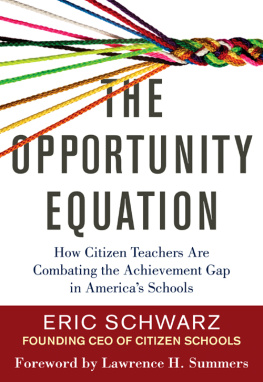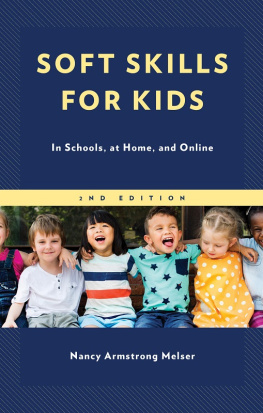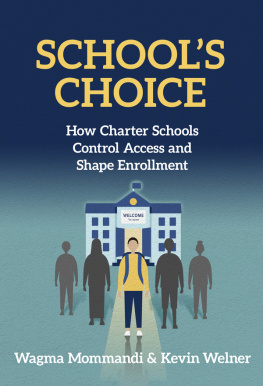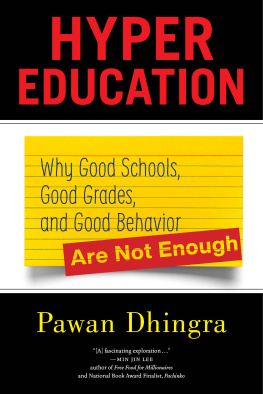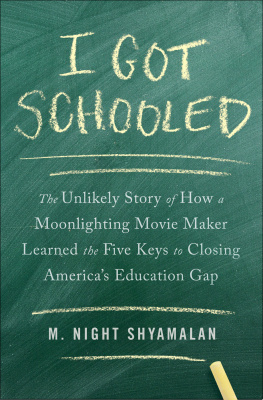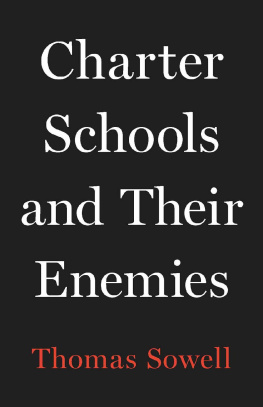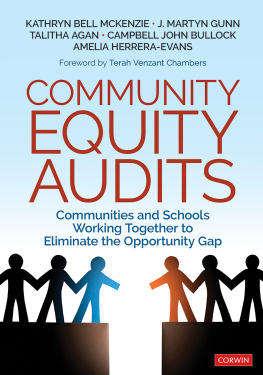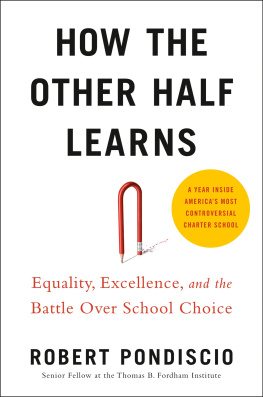
For Maureen, Ronan, and Orla, with love and appreciation
FOREWORD
THE IMPERATIVE OF EQUAL OPPORTUNITY AND THE IMPORTANCE OF CITIZEN SCHOOLS
Lawrence H. Summers is the president emeritus of and Charles W. Eliot University Professor at Harvard University and the former secretary of the treasury of the United States. In February 2014, Summers was elected chair of the Citizen Schools board of directors. His daughter Ruth, referenced below, served as an AmeriCorps Teaching Fellow at Citizen Schools from July 2012 to June 2014.
In an elitist age, the Duke of Wellington famously said that the Battle of Waterloo was won on the playing fields of Eton, attributing the leadership skills of the British military officers he commanded to lessons learned as students at Englands top private school. I believe that the battle for Americas future will be won or lost in our public schoolsand today we are losing.
This was brought home to me when I was treasury secretary. I made it a practice every time I visited a city to go visit a public school. Once I was in Oakland meeting with a group of high school students and gave what I thought was a pretty good speech about the importance of education to national prosperity and individual opportunity.
After I finished, a young teachershe was probably five years older than my daughter Ruth is nowcame up to me and said,
Secretary Summers, that was a terrific speech. But heres the problem:
Why should the children believe that theres nothing more important to the future of this country than education when nobody has come in and painted this school in the last eleven years and the paint is chipping off the walls?
Why should they believe you when you say science education is hugely important, but they get nauseous every time they do a chemistry lab because the ventilation system hasnt been fixed for a year?
Why should they look around and believe you?
I had no good answers, and I have been haunted by this question ever since.
America, if it has stood for anything, has stood for two hundred years for the idea of equality of opportunity. Everyones income is not going to be equal in the United States. The way everyone lives is not going to be equal in the United States. We are going to try to make it fairer and better, but it is never going to be completely equal or fair. It cannot be in a free society.
What we can, and I believe must, aspire to as a nation is that everyones childrenall childrenhave the same chance to succeed. No child should be denied the opportunity to be educated, to follow their dreams, to create, to prosper, and to contribute because of the circumstances of their birth. Those with less money may live in smaller houses, take simpler vacations, and wear less expensive clothes. That is inevitable. But it should not be acceptable to anyone, liberal or conservative, that they be forced to have lesser dreams for their children.
This ideal of equal opportunitythat any child can grow up to be president, to be a billionaire, to win a Nobel Prizeis the American Dream. Yet, as Eric Schwarzs book powerfully illustrates, on the standard of equality of opportunity, our generation of Americans is failing. Of course, there are difficulties in statistics and measurement. But, as best as one can tell, for the first time in two hundred years, the gap in the life prospects of the children of the rich and the children of the poor is greater today than it was one or two generations ago. That should not be acceptable.
Nor should it be acceptable that the United States now trails most other major industrial nations in terms of equality of opportunity and social mobility. In Europe, it is easier for those from disadvantaged backgrounds to succeed than it is for their American counterparts. As a corollary, the successful are more entrenched in the United States than in the nations that are our biggest trading partners and competitors.
The Opportunity Equation offers stories and data that help us see inequality as not just a function of inequality in our schools but a function of the inequality of experiences offered by the broader society. The result is growing inequality in educational attainment, in income, and in family wealth. As just one example, the college completion rate for children of parents in the top quartile by family income has jumped from 40 percent to 73 percent since 1970, but for children of parents in the lowest quartile, it has only grown from 6 percent to 8 percent. As an additional example, despite all that has been done to improve financial aid, the percentage of the students attending our elite universities who come from the upper half of the income distribution is greater than it was a generation ago. As a country, we are moving in the wrong direction with respect to equality of opportunity for lower-income children, and that is not acceptable.
It does not have to be this way. Determined national efforts can make a difference, as they have over the last half century with respect to racial equality. When I was a child, African Americans were massively underrepresented in higher education and the race-based achievement gap in our schools was sickeningly large. We still have a long way to go in fully addressing racism in our society. But whereas in the 1940s and 50s the reading and math skills of the typical white student were four to five grade levels ahead of the typical African American student, today more than half of that skills gap has been eliminated. In the nation as a whole, African Americans are still less likely than whites to attend elite colleges and universities and less likely to graduate, but an African American twenty-year-old is about as likely to be enrolled in college as a white twenty-year-old. More needs to be done, but this is a huge national achievement. It is a national achievement of public policy. It is a national achievement of changed private attitudes. It is a national achievement of reform in almost every institution in our society. It is real progress.
As we have made great progress in combating racial inequality, so too can we overcome inequality of opportunity between the children of affluent and less-affluent parents. That is why I recently committed to chair the national board of directors of Citizen Schools, an organization committed to making such progress with respect to the class divide. I did this in part because I have seen the power of the program firsthand through my daughter Ruth, an AmeriCorps teaching fellow with Citizen Schools, and in part for three other reasons.
The first thing that attracted me to Citizen Schools was the programs commonsense approach of equalizing access to extra learning time in the afternoon and evenings, on weekends, and during the summer. For Boston students in grades six through twelve, the school day ends at 1:30, and across the country all children spend the great majority of their waking hours out of school. Children are three times as likely to be raised by a single parent as they were in 1960, and that parent, usually the mother, is more likely to be working. If that division stands we will never equalize opportunity.
A second compelling aspect of Citizen Schools is that it works with, but remains outside of, the public school system. Im a Democrat. Im a guy who believes in the government. Im a guy who doesnt understand how you can love your country and hate its government. At the same time, Im a guy with eyes, and I know that government cannot do it all. It is a long-standing truth that if we are going to succeed in solving problems, it cannot all just be the government saying what needs to be done, hiring people, and doing it. It needs to be a collective effort of the broader society and its citizens. Just as the children of Englands elite learned to lead on the playing fields of Eton and Oxford and Cambridge, in Americain the twenty-first centurywe need to provide children of all backgrounds with the experiences that will prepare them to lead and to compete.

